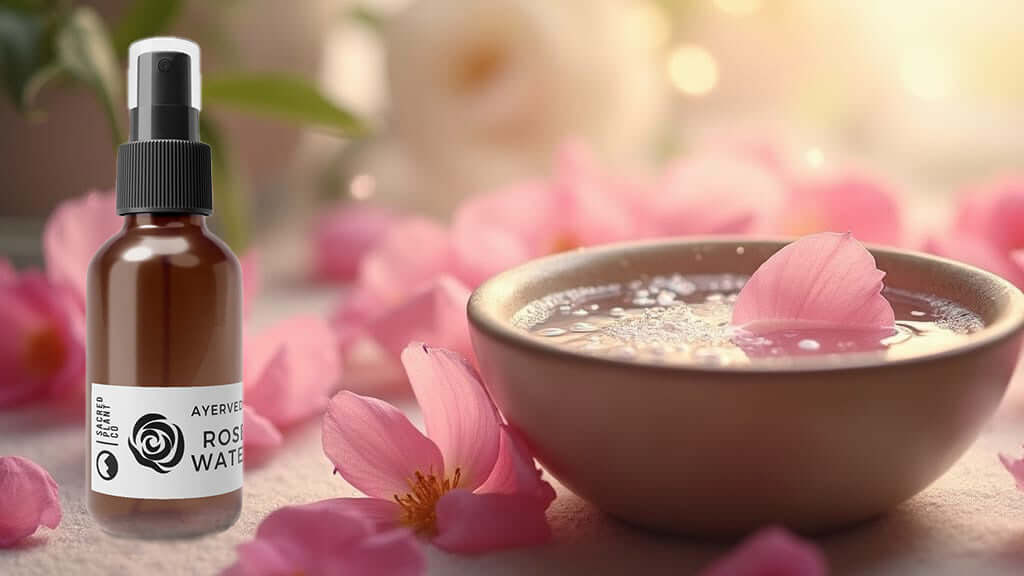Why Steam-Distilled Rose Hydrosol Beats Traditional ‘Rose Toner’
What Exactly is Steam-Distilled Rose Hydrosol?

Steam-distilled rose hydrosol is the pure, aromatic water extracted during the steam distillation of rose petals. Unlike many rose-scented toners, which are typically alcohol-based and synthetically fragranced, true hydrosol is a holistic botanical extract that carries the therapeutic compounds of the rose plant in water-soluble form.
Whereas conventional “rose toners” often rely on denatured alcohol and added fragrance, steam-distilled rose water captures the living essence of the plant without disrupting its integrity. It’s a raw, undiluted expression of the rose’s healing potential.
Why Steam Distillation Matters: Preserving Antioxidants & Active Compounds
Steam distillation is a gentle extraction process that involves passing steam through freshly harvested rose petals. This process preserves the delicate balance of volatile compounds and bioactive nutrients, including flavonoids, phenolic acids, and trace vitamins.
Research confirms the potency of this method:
-
In Molecules (2017), a study titled "Antioxidant and Antibacterial Properties of Rosa Damascena Flower Hydrosol" found that steam-distilled rose hydrosol retained significant antioxidant activity, capable of neutralizing free radicals and reducing oxidative stress on the skin.
-
A 2024 study published in Plants (MDPI, 2024) confirms that Rosa damascena hydrosol contains significant levels of phenolic acids and flavonoids—compounds known for their antioxidative properties. These molecules help neutralize free radicals, supporting skin resilience and slowing visible aging.
-
A 2020 clinical trial published in Journal of Cosmetic Dermatology (PMC10455691) found that rose hydrosol application improved hydration and transepidermal water loss (TEWL) in participants over a two-week period. Researchers noted enhanced skin barrier function without any adverse reactions.
-
Another study on Rosa damascena hydrosol’s effect on the skin microbiome (ResearchGate, 2020) showed that rose hydrosol, when used for hand-rubbing, helped maintain a healthy balance of skin flora while offering mild antimicrobial effects. This positions hydrosol as both protective and nurturing to the skin’s natural defenses.
In contrast, alcohol-based toners often degrade or exclude these sensitive plant actives, sacrificing efficacy for shelf stability.
Rose Hydrosol vs. Traditional Toner: A pH Comparison
Maintaining your skin’s natural pH—generally around 4.5–5.5—is essential for a resilient barrier and healthy microbiome. Disruption of this acid mantle can lead to irritation, breakouts, and premature aging.
| Product Type | Typical pH Range | Skin Impact |
|---|---|---|
| Rose Hydrosol | 5.0–5.5 | Supports natural skin pH; soothing |
| Alcohol-Based Toner | 3.0–4.0 (acidic) or 7.0+ (alkaline) | Can strip barrier, cause dryness or flare-ups |
Steam-distilled rose hydrosol aligns closely with the skin’s ideal pH, helping restore balance post-cleansing without disrupting lipid integrity.
Zero Alcohol Advantage: Protecting Your Skin’s Natural Barrier

Many toners—especially those marketed for acne or “tightening” effects—contain alcohol. While initially refreshing, these formulations often leave skin chronically dehydrated, irritated, or inflamed.
According to "Impact of Alcohol on Skin Barrier", alcohol compromises the stratum corneum by disrupting intercellular lipids, which leads to increased transepidermal water loss and impaired barrier repair.
In contrast, rose hydrosol is 100% alcohol-free. It supports skin hydration, preserves the moisture barrier, and reduces reactivity—making it ideal for daily use, even on sensitive or compromised skin.
Comprehensive Skin Benefits of Steam-Distilled Rose Hydrosol
Acne-Prone Skin
-
Reduces inflammation and redness thanks to natural anti-inflammatory compounds like quercetin and kaempferol.
-
Balances sebum production without stripping the skin, unlike harsh astringents.
"Anti-inflammatory effects of Rosa Damascena", Iranian Journal of Basic Medical Sciences, 2011.
Dry & Dehydrated Skin
-
Deeply hydrates through humectant properties that attract and retain moisture.
-
Improves elasticity and texture with regular use.
Mature & Aging Skin
-
Protects against oxidative stress that accelerates fine lines and dullness.
-
Stimulates skin renewal and supports collagen integrity.
How to Use Steam-Distilled Rose Hydrosol for Best Results
Here’s how to integrate rose hydrosol into your daily skincare ritual:
-
Post-Cleansing Mist: Apply 3–5 sprays onto clean skin to balance pH and prep for moisturizer.
-
Layer Under Creams or Serums: Use as a hydrating base before applying heavier products.
-
Midday Skin Refresh: Reapply over makeup to revive and soothe skin on the go.
-
Post-Sun Treatment: Combine with aloe vera for a cooling, calming compress.
-
As a Mask Activator: Mix with powdered masks for added hydration and healing power.
Why Choose Real Hydrosol Over Traditional Toners (Summary)
Steam-distilled rose hydrosol is:
-
Rich in naturally occurring antioxidants and therapeutic compounds
-
pH-balanced to support a healthy skin barrier
-
Alcohol-free and non-irritating
-
Versatile across all skin types and concerns
Conventional rose toners may smell sweet, but they pale in comparison to the botanical richness of real hydrosol.
👉 Try the real hydrosol and elevate your skincare ritual.
FAQ: Everything You Need to Know About Steam-Distilled Rose Water
Can I use rose hydrosol every day?
Absolutely. It’s gentle enough for daily (even twice-daily) use and helps maintain hydration and balance.
Is rose hydrosol safe for sensitive skin?
Yes. It’s free of alcohol and synthetic additives, making it ideal for reactive or compromised skin.
What’s the difference between rose hydrosol and rose water?
True rose hydrosol is steam-distilled and contains bioactive compounds. Many “rose waters” are merely water with added fragrance.
Can I use rose hydrosol with other products?
Definitely. Use it as a toner, facial mist, mask activator, or layering base under serums and moisturizers.
Does rose hydrosol expire?
Yes, because it’s preservative-free. Keep it in a cool, dark place and use within 6–12 months for maximum potency.






